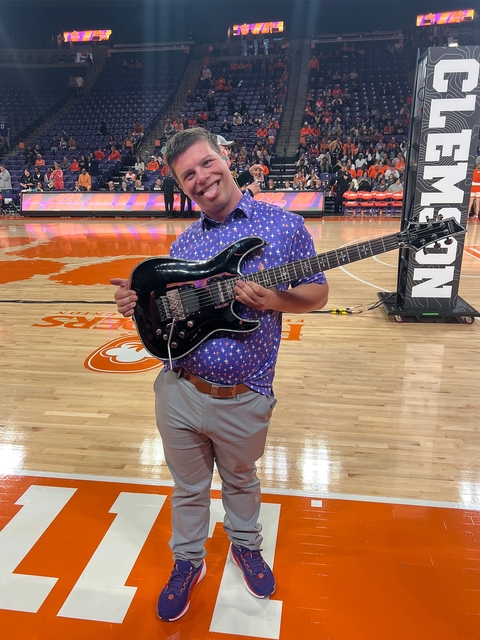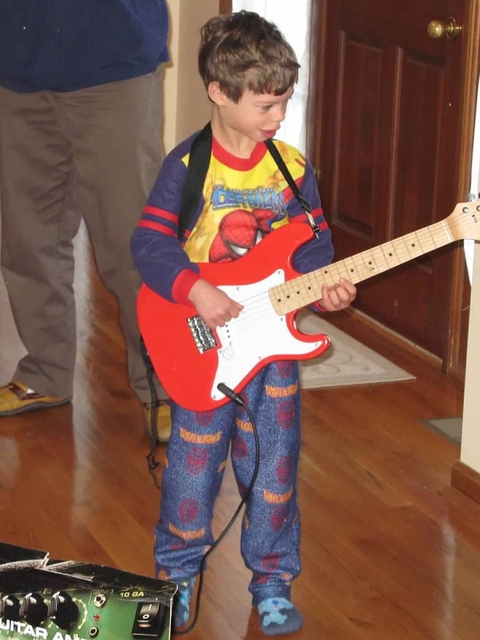Williams Syndrome: Nicolas’s Story
Williams Syndrome: Nicolas’s Story

Nicolas is 24 years old and lives in South Carolina. He works part time at the visitor and alumni center for a local university, and plays electric guitar “like a boss,” according to his mom, Noel. He was diagnosed as a baby with Williams syndrome and has grown into an independent, sociable young adult.
Williams syndrome (WS) is a developmental disorder caused by the deletion of a set of genes from a particular region of chromosome 7. The genetic defect occurs spontaneously in an estimated 1 in 7,500 to 10,000 people. People with Williams syndrome have a cluster of characteristics, including distinctive facial features; outgoing, engaging personalities; learning difficulties and cognitive disabilities; and heart and vascular problems.
The Armellino Center of Excellence for Williams Syndrome at CHOP is a collaboration with Penn Medicine – a multi-specialty clinic that seeks to improve long-term outcomes for both children and adults with Williams syndrome. Nicolas first came to the Armellino Center as an adult, and he has found an expert team here who will monitor his care across multiple disciplines and support him as he completes his transition to adulthood.
Early difficulties lead to a diagnosis
Nicolas was born in Cincinnati, two weeks overdue. He was a small baby who had trouble feeding from the start – projectile vomiting, colicky, somewhat inconsolable. After Noel consulted “nearly every lactation consultant in the tri-state area,” she was referred to a local hospital's feeding center, which found no obvious root cause for the feeding difficulties. From there Noel and her husband, Sylvain, consulted other specialists.
“When the cardiologist saw Nicolas, she knew by sight that he had Williams,” Noel says. By the time he was 3 months old, genetic testing had confirmed the diagnosis. Nicolas’s parents mobilized immediately to take advantage of early intervention programs so he could get the assistance he needed as he aged into school.
Nicolas has not faced many major medical challenges related to Williams syndrome, apart from a slight heart murmur and an asymptomatic Chiari malformation (a rare condition in which brain tissue pushes down through the skull opening into the spinal canal). Though he experienced some developmental delays as a child, the WS doctor who conducted Nicolas’s early IQ testing – Carolyn Mervis, PhD, now on the Armellino Center’s research team – considered him high functioning.
Getting school support and living independently

Nicolas attended mainstream school with an individualized education program (IEP) that addressed his learning needs. His parents always encouraged him to be self-sufficient. “We don’t overcoddle him,” Noel says. “Yes, he is higher functioning from an IQ standpoint. But we also set an expectation for him to be more independent, to fix food and do laundry, things like that.”
After graduating from high school in New Jersey, Nicolas moved to a four-year program called Clemson LIFE (Learning Is For Everyone). The curriculum focuses on independent living and acquiring job skills – budgeting, apartment living, social skills and interviewing. The school organizes job rotations in the community, so students can gain work experience.
Like many people with Williams Syndrome, Nick is outgoing, with expressive language skills, and he wanted a job where he could interact with the public. And fun fact: he loves car washes. He knows the makes and models of all the machinery used. When a family friend introduced him to a local car wash owner in Clemson, it wasn’t long before Nick had convinced the owner to hire him for a job rotation.
Looking toward the future
Nick has fashioned a fulfilling, independent life in South Carolina. He travels by himself to visit his family in New Jersey. Outside of work, he hangs with friends, sings karaoke and occasionally hops on stage to jam with bands performing locally (crowds know him by his social media handle, Slick Nick). In fact, he recently played the national anthem on his guitar at a Clemson women’s basketball game.
When Nicolas attended a WS conference a few years ago, he met team members from the Armellino Center. Afterward, Noel reached out to the center’s program coordinator, Cindy Tsikalas, to make an appointment for Nicolas.
His care is overseen by Armellino Center physician Matthew Demczko, MD. “As he ages, various medical issues are likely to crop up that were not a problem during childhood,” Noel says. “To have an expert team of doctors who know the syndrome, and know what to look out for, is invaluable.” Nicolas has participated in the Armellino Center’s FLIGHT-WS research study, which looks to study and psychosocially support people with Williams Syndrome during their transition to adulthood.
Staff at the Center are also helping Nick apply for Social Security Disability Insurance (SSDI). The Center can support Nick’s application with the right kind of testing and documentation, an often-intimidating hurdle to clear.
What advice does Noel have for parents of kids with WS? Noel is grateful that when Nick was a toddler, Dr. Mervis encouraged them to consider planning for Nick’s post-secondary education, because it gave them the runway they needed to save money and tailor Nick’s IEP plans to meet his goals. “Getting your child seen by a Williams syndrome clinic, with doctors who know the syndrome, is key,” she says. “It gives you the information you need to develop an action plan – what kind of support and care will you need, and how can you best prepare for your child’s future?”
Beyond that, Noel reiterates, don’t be a helicopter parent! “Set clear expectations that are aligned with what they’re capable of and then hold them to it,” she urges. “Make some reasonable goals and then find a program that will help them achieve those goals.”